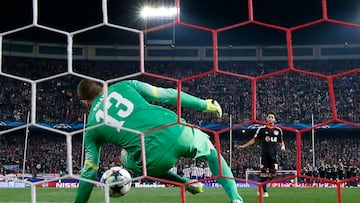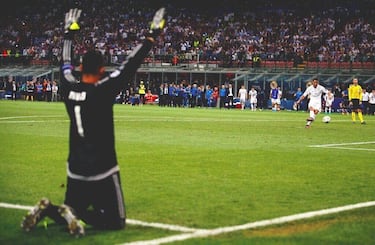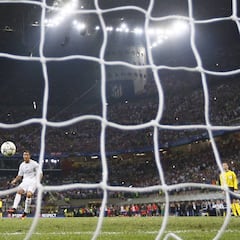2023 Champions League final: How do penalty kick shoot-outs work?
What will happen if the Champions League final ends level after extra-time? Who decides who takes the penalties?

A penalty shootout isn’t an ideal way to resolve the biggest game in club football, but sometimes, there’s no only way. Since the Champions League (formerly the European Cup) began in the mid-50s, a total of 11 finals have gone to extra-time then penalties.
See also:
The first final to be decided from the spot was the 1984 meeting between Roma and Liverpool, remembered, if for nothing else, for Bruce Grobbelaar’s spaghetti legs routine as Francesco Graziani was placing the ball on the spot for his kick. It did the trick, as the Italian blazed his effort over the bar.
The last to be decided on penalties was the 2015/16 derby final between Real Madrid and Atlético.
John Terry still has nightmares about his penalty miss in the Champions League final, 15 years ago ⏮️ pic.twitter.com/r5xv7XfLB1
— Football on BT Sport (@btsportfootball) April 4, 2023
Of the 11 finals that have been resolved from 12 yards, only two have gone to sudden death. PSV Eindhoven edged Benfica 6-5 in 1987/88 and the 2007/08 all-English final between Man United and Chelsea. John Terry’s slip taking the fifth kick was a reminder of how nerves can get to players when the pressure’s on.

Will there be extra-time and penalties in the Champions League final?
If the score is level when the ref blows for full-time, then yes. Since the tournament began, 17 finals have been settled after the full 90 minutes, five of them in extra-time and 11 with a penalty shootout.
European Cup/Champions League finals decided by a penalty shootout
- 1984/84 Liverpool 1-1 Roma (4-2)
- 1985/86 Steaua Bucharest 0-0 Barcelona (2-0)
- 1987/88 PSV Eindhoven 0-0 Benfica (6-5)
- 1990/91 Red Star Belgrade 0-0 Olympique Marseille (5-3)
- 1995/96 Juventus 1-1 Ajax (4-2)
- 2000/01 Bayern Munich 1-1 Valencia (5-4)
- 2002/03 AC Milan 0-0 Juventus (3-2)
- 2004/05 Liverpool 3-3 AC Milan (3-2)
- 2007/08 Manchester United 1-1 Chelsea (6-5)
- 2011/12 Chelsea 1-1 Bayern Munich (4-3)
- 2015/16 Real Madrid 1-1 Atlético (5-3)
What happens if the final is still tied after extra-time? What is the penalty shoot-out procedure?
If the score is still level after extra-time, the winner will be determined via a penalty shoot-out, in accordance with IFAB Laws of the Game.
Both teams will take a minimum of five penalties each in a best-of-five series. The referee will toss a coin to determine the goal where the kicks will be taken. A second toss of the coin will decide which team takes the first kick and who will go second.
Each captain is responsible for selecting the first five players who will take the kicks and the order in which they take them.
The penalty taker and both goalkeepers are the only ones allowed to remain near the goal area, all other players must remain in the centre-circle or behind the halfway line.
Related stories
The penalties are taken alternately by each team until both have taken five kicks - or until it is no longer possible for one of the teams to win the best-of-five series (eg. if one team converts their first three penalties and the other misses their three, the shoot-out is technically over).
#OnThisDay in 2001, Oliver Kahn saved three spot kicks as Bayern beat Valencia 5-4 on penalties in the #UCLfinal. pic.twitter.com/MJxyTohNvT
— UEFA Champions League (@ChampionsLeague) May 23, 2016
Sudden death
If, after both teams have taken five kicks, the scores are still level, the shootout will enter sudden death - ie. both teams will continue taking one penalty each until someone misses or their shot is saved. The winner will be the one who has scored the most goals after both teams have taken the same number of kicks.

